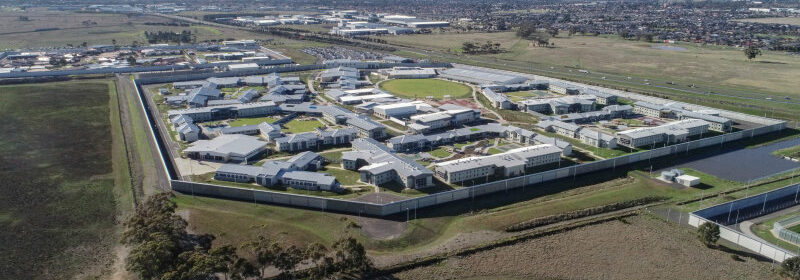‘Bully or be bullied’: Harassment, sexism rife among staff in Victoria’s prison, report finds

Bullying and sexism are endemic among staff in Victoria’s prison system, a new report has found, with three-quarters having witnessed harmful workplace behaviour by one of their colleagues in the past five years, including discrimination and sexual harassment.
The Corrections Cultural Review, released by the justice department on Friday, details the staggering prevalence of workplace harm between staff in Victoria’s prison system. It found 24 per cent of women reported experiencing sexual harassment from a colleague and almost a third witnessed it occur.
The Ravenhall Correctional Centre in Melbourne’s west.Credit:Joe Armao
Prison staff said in the report that bullying and harassment had made their already challenging jobs more stressful and caused many of them to quit or consider quitting, develop substance abuse issues and consider taking their own life.
Corrections Minister Enver Erdogan said the report portrayed a system in need of reform to protect the safety of staff, prisoners and the community.
“We want to avoid people coming into contact with the justice system in the first place – but for those who do, the system has a duty of care to look after them and help them get their lives back on track. This review sets out what we must do better to fulfil this duty – and we will do better,” Erdogan said.
Power dynamics derived from traditional male-dominated command and control structures, perceptions of authority and social norms of mateship and silence continue to influence the custodial culture and daily experiences of staff and people in custody, the report says.
It found that more than half of staff had been bullied by colleagues, with 30 per cent of employees being verbally abused and threatened by a workmate and 64 per cent witnessing bullying where the perpetrator was a co-worker.
“It is assumed that you are thick-skinned and bullying and harassment are a part of the culture in Corrections,” one prison worker told officials compiling the report.
“You’ve really got a choice: bully or be bullied,” another said.
Another employee said: “I have more problems with staff than prisoners … its constant comments of like, ‘Learn to speak English, I can’t understand you’ or ‘You’re not part of the culture of the area because you don’t have an Aussie accent’.”
You’ve really got a choice: bully or be bullied.
Dated mentalities regarding inmates were also common among staff, the report found, with prison workers reporting that some of their colleagues believed that: “They’re just prisoners. They’ve
broken the law, they’re bad people, so we should treat them [badly].”
The report heard from one prison staff member who was maligned as a “crook lover” by their colleagues for helping prisoners to access rehabilitative programs and services.
“We help the guys, we assist them, we get them onto programs. We try to get them to service providers. A lot of the custodial staff here, especially those [who] have been prison officers [for decades]. They don’t respect that, that don’t see that,” the staff member said.
“There’s the name-calling, ‘care bears’, ‘crook lover’, that kind of thing. But there is [also] the, ‘You can’t help them. I don’t know why you bother with programs’.”
Homophobia and transphobia persist in Victorian prisons, the report found, with LGBTQ people in custody facing greater risk of violence and sexual assault.
“They may be targeted by other people in custody, and there is often a high tolerance for such behaviour and stigma around reporting it,” the report says.
Justice Reform Initiative executive director Dr Mindy Sotiri said the Victorian government needed to do more than “simply patch a broken system” and encouraged a more therapeutic approach to policy.
“Prison is not the place to address drivers of incarceration. We need to do the hard work to prevent people from coming into contact with the criminal justice system in the first place, and to divert people from incarceration with evidence-based alternatives,” Sotiri said.
“We need to act on the evidence to reorient policy and funding, making broader reform and investments to keep people out of prison and improve community safety.”
In Victoria, 43.6 per cent of prisoners released during 2018–19 returned to prison within two years, according the Sentencing Advisory Council, an independent statutory body.
“Re-orienting the adult custodial corrections system to more effectively addressing recidivism will require significant government investment,” the report says, “in humane and appropriate infrastructure, in the capability and value of staff, in effective and sustainable approaches to supervised community participation, community transition and in quality healthcare.”
There are 15 prisons in Victoria, comprising minimum, medium and maximum security facilities. Twelve are publicly operated while the remaining three are run by private companies on behalf of the state government.
There are 5131 custodial staff working in the prison system, with about 70 per cent employed in public facilities.
‘I have more problems with staff than prisoners … its constant comments of like, “Learn to speak English, I can’t understand you” or “You’re not part of the culture of the area because you don’t have an Aussie accent”.’
In public prisons, men comprise 62.5 per cent of the workforce and women 37.5 per cent, while across the private prisons at Port Phillip Prison and Fulham Correctional Centre the gender difference is similar, the report states.
The Andrews government has committed to reforming the tough bail laws it introduced in 2018, decriminalised public drunkenness and vowed to raise the age of criminal responsibility from 10.
If you need support, call the National Sexual Assault, Domestic and Family Violence Counselling Service on 1800RESPECT (1800 737 732).
The Morning Edition newsletter is our guide to the day’s most important and interesting stories, analysis and insights. Sign up here.
Most Viewed in National
From our partners
Source: Read Full Article
